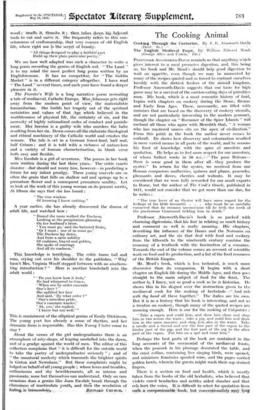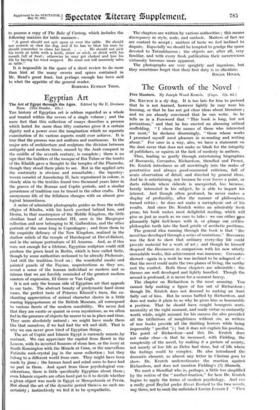The Cooking Animal
CoOkiag -Through the. Centuries, By J. R.. Ainsworth-DaVIA.
The English Medieval ,feast.. By William Edward '_Mad. (George Allen and Unwin., f5s.) - PROFESSOR A1NSWORTII-DAVIS reminds us that anything which gives interest to a meal promotes digestion, and, this being his book and Mr. Mead's should help good digestion to wait on appetite, even though we may be nauseated by many of'the recipes quoted and,so forced to contrast ourselves harshly with the dirtiest feeders of the animal kingdom. Professor Ainsworth-Davis suggests that our taste for high game may be a survival of the carrion-eating days of primitiye man. 'His book,:.which is a most romantic history of food, begins with chapters on cookery during the Stone; Bronze
and Early Iron Ages: These, necessarily, are filled with Surmises that are based on the discovery_ of cookery,utensils,
and are not particularly interesting to the modern gourmet, though the chapter on " Romance of the Spice Islands " will enchant all those who agree with Meredith that; " A woman ivho has mastered sauces sits on the apex of civilization " From this ;Ant in the book the author never ceases .te • enthrall. He Mimi- -s how discovery and colonization resulted
in more Varied menus in all parts of the world, and he seasons his feast of knowledge with the spice of anecdote and quotation. He helps us to feel more respect_ for our ancestors,
of whom Sallust wrote in 50 The poor Britons— there is some good in them after all—they produce the oyster." In return for the oyster, we received from our Roman conquerors mulberries, quinces and plums, peacocks, pheasants and doves; cherries - and walnuts. It may be considered that we were fully rewarded for our small exports to Rome, but the author of. The Cook's Oracle, published in 1817, would not- consider.that we got more than our due, for
he writes : - •
" The true loVer of an Oyster will have soma regard for the feelings of his little -favourite . . . who must be so carefully extracted that he remains unconscious till he feels the teeth of the piscivorous Gourmand tickling him to death."
Professor Ainsworth-Davis's book is so packed with charming digressions, that his feat; in relating so much history and comment as well is really amazing. His chapters, 'describing the influence of the Danes and the Normans on culinary art, and the six that deal with food and cookery from the fifteenth to the nineteenth century combine the economy of a textbook with the fascination of a romance. Towards the end of the volume comes an account of scientific work on food and its production, and a list of the food resources of the British Empire.
Mr. Mead's book, which is less technical, is much more
discursive than its companion. It begins with a short chapter on English life during the Middle Ages, and then goes straight to the main subject of food for the feast. The author is, I fancy,' not so good a cook as he is historian. He shows this in his disgust over the instruction given to the mediaeval cook for the making of herbelade—" And rub with thy hand all these together." The italics are his own.
But it is as a history that his book is interesting, and not as a treatise on cookery, though many of the quoted recipes are amusing enough. Here is one for the making of Cokyntrice : " Take a capon and scald Jilin; and draw him clean and chop him in two across the waist ; take a pig, and scald him and draw him in the same manner, and chop him also in the waist. Take a needle and a thread and sew the fore part of the capon to the hinder part of the pig, and the fore part of the pig to the after part of the capon. Put him on a spit and roast him."
Perhaps the best parts of the book are contained in the long accounts of the ceremonial of the mediaeval fea.sts, when the peacock in his plumage decorated the table, and the crust coffins, containing live singing birds, were opened, and miniature fountains spouted wine, and the pages carried golden bowls, wherein the guests might wash their sop-stained
fingers.
• There is a section on food and health, which is mostly taken from the books of the old herbalists, who believed that violets cured headaches and nettles aided slumber and that eelsburt the voice. It is difficUlt to select for quotation from
'snib„,.4;;'ixttn– nEm-t unable' boolc, but 'conYentionaliafi: to possess a copy of The Boke of Curtasy, which includes the fallowing maxims -for' table manners: "A guest should not spit upon or over the table. He should not scratch or claw his dog, and if he has to blow his nose he should remember to clean his hand.. . . He should not. pick his "teeth at table with a knife,' straw or stick, or drink with-his mouth full of food ; otherwise he may get choked and lose his life by having his wind stopped. He must not 'tell unseemly tales at table."
It is impossible in the space of a short review to do more than hint at the many sweets and spices contained in Mr., Mead's great feast, but perhaps enough has been said to, whet the appetite of the general reader.
BA.RBARA. EUPHAN TODD.



















































 Previous page
Previous page